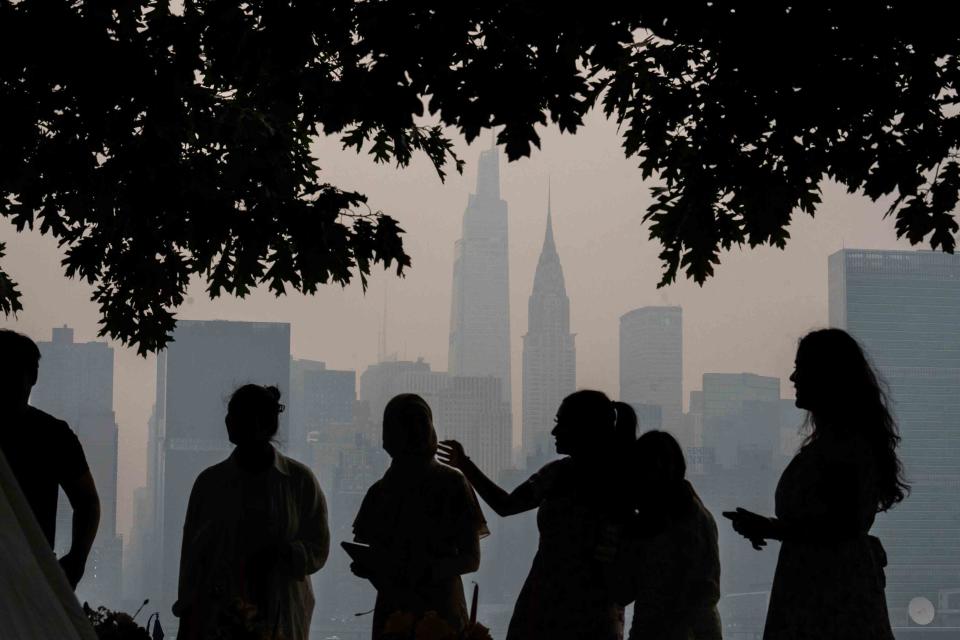Here's How Air Pollution Is Affecting Your Skin
Fortunately, you can protect your complexion.

Getty Images
With air quality plummeting across the country due to unprecedented levels of wildfire smoke, awareness about air pollution is at an all-time high. Not only does it have dire ramifications for the environment and our overall health, but, as it turns out, poor air quality can harm our collective skin health, too.
While skin care may be the last thing on your mind — rightfully so — as another environmental disaster rages on, it may still be worth considering since pollution can contribute to everything from acne to dark spots. And, fortunately, an entire overhaul of skin-care products isn't required. Rather, "with proper skin care and personal protection, we can effectively prevent pollution-related damage to the skin," says Joshua Zeichner, MD, a board-certified dermatologist and the director of cosmetic and clinical research in dermatology at Mount Sinai Hospital.
Let's start with context: Generally speaking, "air pollution is composed of both noxious gases and particulate matter that has been shown to have harmful effects on our skin and our bodies in general," says Dr. Zeichner. "Forest fires are specifically associated with an increase in particulate matter in the air."
Particulate matter consists of tiny particles that can glom onto and wreak havoc on skin. "Not only can the particles get trapped in the skin and contribute to clogged pores and breakouts, but the free radical damage can accelerate signs of skin aging, including dark spots and fine lines and wrinkles," says Marisa Garshick, MD, a board-certified dermatologist at MDCS Dermatology
Free radicals can also worsen existing issues. They "may also contribute to increased inflammation of the skin, which can also trigger flare-ups of conditions like eczema, psoriasis, acne, and rosacea," she says.
Finally, free radicals can also damage proteins and genetic information in our skin — so thinking about ways to protect your skin against air pollution is essential, says Hadley King, MD, a New York City-based dermatologist.
The upside: Knowing how poor air quality impacts skin is key to counteracting it. Here, what dermatologists recommend.
Related: All of the Benefits of Using Vitamin C in Your Skincare Routine
Do a Thorough Cleanse
First, a proper cleanse will help eliminate any physical buildup on the skin. "Stick to a gentle, soap, free cleanser that won’t disrupt the skin barrier," says Dr. Zeichner, who recommends the Dove Fragrance-Free Beauty Bar — which he says can be used on both the body and face.
If your skin is starting to appear dull, take it as your cue to gently exfoliate. Dr. Garshick recommends either Charlotte Tilbury Glow Toner or the First Aid Beauty Radiance Pads to help restore radiance to the skin.
Use Antioxidants
All of our experts agree that one of the best ingredients to protect your skin from air pollution is an antioxidant. "Topical antioxidants can help to neutralize free radicals in smoke to help prevent damage," says Dr. King. She recommends vitamin C, vitamin E, ferulic acid, resveratrol, and astaxanthin as some of the key antioxidants to look for in your skin-care routine. And, on the inflammation front, an antioxidant like niacinamide can reduce redness and calm and soothe irritation, says Dr. Garshick.
Related: Here's Why Vitamin E Is in So Many of Your Skincare Products
But if you go with a single antioxidant, make it vitamin C. That's because "vitamin C is perhaps the most potent antioxidant we have for topical application," Dr. Zeichner explains. "It neutralizes free radical damage to prevent skin inflammation, and blocks production of abnormal pigmentation." He recommends the Eucerin Age Defense SPF 50, since it provides UV protection, hyaluronic acid, and a blend of antioxidants (including vitamin C) to protect skin against environmental aggressors.
Stay Hydrated
Next, max out your hydration. For starters, look for ingredients that provide hydration and support and strengthen the skin barrier, such as hyaluronic acid and ceramides, says Dr. Garshick. She's a fan of Vichy Mineral 89 Prebiotic Recovery Serum (which also contains niacinamide) and Avene Cicalfate+ Restorative Protective Cream.
If the skin appears dry or inflamed, avoid harsh active ingredients — like benzoyl peroxide or salicylic acid — as they may only further aggravate the skin, she says.
Stick With Sunscreen
When you do go outside, cover up as much as you can with long sleeves and pants and be sure to always wear sunscreen. "When air pollution is combined with UVA rays, the damage can be amplified," Dr. King says. That goes even if the weather is cloudy or hazy. "Just because the air may seem cloudy, that does not mean that UV rays won't penetrate through to the earth's surface," adds Dr. Zeichner.
Related: We Tested 52 Sunscreens, These 12 Are the Absolute Best
Stay Indoors
Finally, stay inside if possible, says Dr. King. Use an air purifier to help improve the air quality around you, and if you do need to venture outdoors, wear a N95 mask to provide a physical barrier against pollution.
Once you're back inside, change into the clean clothes and cleanse your body and face. Clothes can be contaminated with combustion particles and semi-volatile compounds that can pass through clothing and affect the skin, she says.
Related: Ferulic Acid Is the Trending Ingredient You Need in Your Skincare Routine
For more InStyle news, make sure to sign up for our newsletter!
Read the original article on InStyle.

